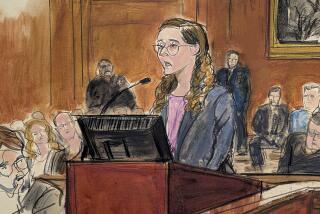Prosecutors Try to Salvage Payola Probe : * Investigation: A local record promoter has been indicted, but it isn’t clear whether more charges will be filed in wake of a ruling that voided a key case.
- Share via
The indictment this week of a local record promoter on tax charges shows that prosecutors are trying to salvage something from a costly federal payola investigation that ran aground last year when a judge threw out a key case on grounds of government misconduct.
But it is still uncertain whether the long-running probe may rekindle and spread further. The prosecutors aren’t saying.
On Wednesday, a federal grand jury returned a three-count indictment charging Ronald T. Ellison of Sherman Oaks with claiming $316,820 in false deductions on his corporate income tax returns for 1984, 1985 and 1986.
The U.S. attorney’s office in Los Angeles said in a statement that the case arose from the grand jury probe of payola in the record industry and was developed by the Criminal Investigation Division of the Internal Revenue Service and the U.S. attorney’s Organized Crime Strike Force.
That probe also produced the Nov. 30, 1989, indictment of powerful record promoter Joseph Isgro and two others on 57 felony counts including payola, racketeering and conspiracy to distribute cocaine. Isgro was accused of bribing radio station employees with cash and cocaine in exchange for playing songs he promoted.
But in a devastating setback to the five-year, multimillion-dollar investigation, U.S. District Judge James M. Ideman dismissed the charges on Sept. 4, 1990, citing “outrageous government misconduct.” He said prosecutors withheld evidence that a key prosecution witness had changed his story.
The prosecution’s appeal of the dismissal has been pending for nearly a year.
Ellison is vice president for urban promotions at Polygram Label Group, responsible for the record labels Island, London, Polydor and Smash, a company spokesman said.
Ellison, 50, joined Polygram in 1987, but during the period covered in the indictment he ran an independent record promoting company in Sherman Oaks called Effective Music Marketing Inc.
According to the indictment, Ellison claimed deductible expenses of $312,726 for 1984, of which $86,298 were phony; he claimed expenses of $403,355 the following year, of which $196,227 were phony, and he claimed $197,516 in 1986, again padding the number by $34,295 in bogus expenses.
In its statement, the U.S. Attorney’s office said Ellison wrote checks in the names of fictitious people and then cashed them at check-cashing services in Chicago and in Richmond, Calif.
An investigator who asked that his name not be used said there is no known connection between Isgro and Ellison. Ellison’s name surfaced independently in the probe, and his case was pursued by a different team of investigators.
The Ellison indictment is the first activity in the probe since the Isgro case was dismissed. One source familiar with the probe speculated that the government is anxious to show some results from an investigation that has been ongoing since the mid-1980s.
“The IRS is embarrassed at how much money and time it spent and wants to salvage something,” one source said.
More to Read
Sign up for Essential California
The most important California stories and recommendations in your inbox every morning.
You may occasionally receive promotional content from the Los Angeles Times.













